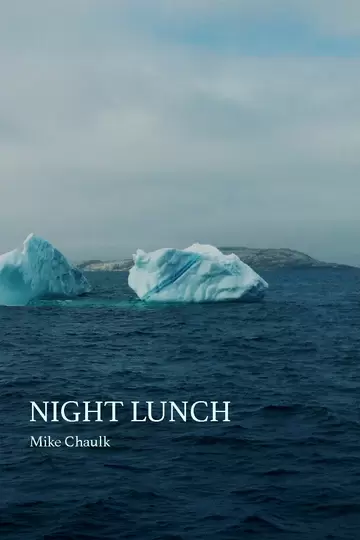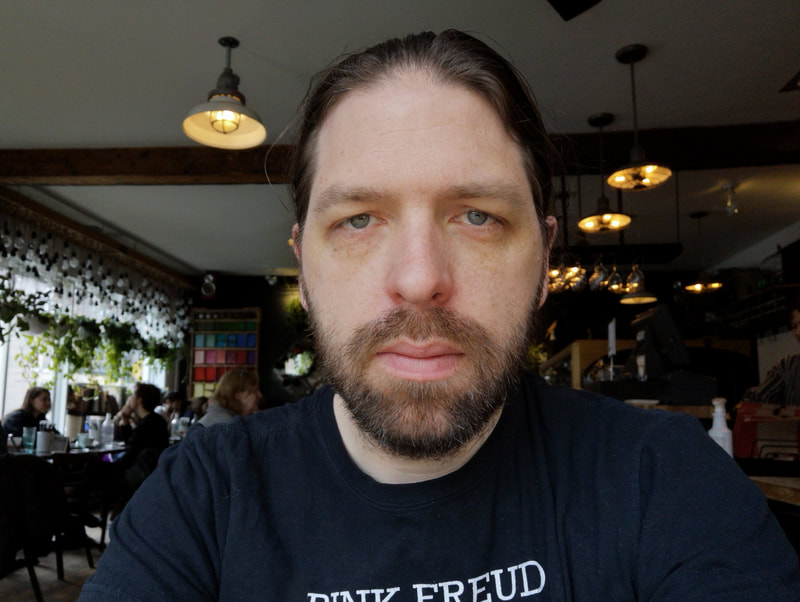Night Lunch
|
|
Mike Chaulk’s engrossing Night Lunch is a series of sonnets that take different shapes: couplets, variations on the four stanzas, sometimes a fifth that allows for a full poem yet feels like it is missing its third line, and of course, the Block of Text. Here and there a blank space appears, a line is left incomplete and, on occasion, rhymes are allowed to enter the book for impact. Chaulk generally breaks at the end of the line, but regularly lets his lines enjamb, heightening the speed for a moment. Yet while this book is solid on form, the poems do not read as sonnets. Form effaces itself in favour of rhythm and movement, which is the mark of a good sonnet, and of the progression of a patient work around the subject matter of the book.
All the poems in the collection are simply numbered, aside from the last section, “Crown of Broken Blood.” The numbered poems appear as variations on the same theme: life on a ship off the North Coast of Labrador. We see the narrator between work shifts with crewmates, the meaning of this word, “crewmates,” appearing clearly through the moments he recounts. To convey the forced proximity of work and life, of course, “co-workers” wouldn’t do, and neither would “roommates.” Each person is simply referred to by name, with few explanations; each has their own presence, their own place on the ship, in spaces that resist intimacy and comfort. They search for togetherness in the succession of shifts, and find it, along with respite and sharing, in moments like the night lunch. There’s camaraderie running through their incomplete relationships, something just short of kinship, but close to it. The narrator mentions having picked up something of his father’s and maternal grandfather’s occupation (“our shared work, the sea,” 9), and meets someone who knew his great-grandfather. Other ghosts join them – ghosts of other people’s crewmates, those who choose to remain at sea. Chaulk offers a dynamic origin for ghosts, tied to their intentions and desires while living, a progressive becoming (and (be)coming together):
This proximity with others is made up of television, meals, jokes, but also of something that oscillates between loneliness and solitude. And in silent moments, when the habit of the presence of the ship and of others is frustrated, fear emerges. As the ship is docked and stops running, silent to the point of absence, the narrator loses a sense of purpose and togetherness: “Running ships give work, a place to stay, food. // But I’ve seen a ship leak, a ship with fires, / seen crews on TV remembered with choirs.” (14) The ship is “a world onto itself” (a line I thought I had read in the book but now cannot find), obsessively present, interrupting moments when it is forgotten. We glimpse the materiality it bears for all the senses; we approach it like a ground, something akin to land.
Poem #43 interrupts the flow of sonnets to question the devices put in place to ensure safety—ostensibly here the safety of an Inuk community, echoing the safety of the ship that constantly surrounds the scene:
The obsessive repetition at the end of the poem brings us back to a closer “this” as the act of writing or reading by taking us out of the flow of the collection. But as much as he might write about it, Chaulk is not concerned with the ship. It’s what it leaves behind it that matters: “Wake needs a ship yet is its own, complete.” (3) He’s looking for a manner of belonging to the land and sea other than through the ship; a different ground, the ground that exists for the ship, through a careful meditation on kin.
As the “Night Lunch” section draws to a close, and after a series of poems centred around the attempted settlement of Labrador by George Cartwright, the numbered poems begin to make room for Chaulk’s search for family and kin connection to the places the ship passes. The section closes on the image brought forward in the first poem, a “great white-bear,” intensifying a reflection on the return to home, to family, beyond “a settler history built to displace.” (38) This line of reflection is quietly present in earlier poems, and comes in full view at the end of the sequence. In relation to working class Newfoundland English, first: “All my life my language was tinted, called off. / Here now, surrounded, it swells—given breath.” (40) But also more directly, and cryptically: “my family line bruised with long forgetting too.” (38) Early on in the sequence, he wonders:
Closing the book, “Crown of Broken Blood” is a sequence of 15 poems through which Chaulk explores his family’s severed ties to the communities of Nunatsiavut and Natuashish—and the persistence of these ties alongside those to communities in Labrador. This sequence is not quite a crown of sonnets, since the last poem is an additional sonnet that takes up the last line of the previous sonnet and modifies the first line of the opening sonnet, but without repeating the previous first line. Yet given the topic and reflection, it is fitting that the fifteenth poem provides an opening rather than a closing sonnet, so that colonialism does not simply repeat. This crown of sonnets offers Chaulk an opening to reclaim Indigeneity—or more appropriately, to allow Indigeneity to reclaim him. He opens a door, accepts a possibility, without turning to identity, and especially not bloodlines, instead focusing on doing, on repeating what others have done before him, and wondering about what repetitions due to colonialism need to cease. Beyond its well-balanced formal aspects, the strength of Night Lunch lies in relating this moment of openness and desire for relationality. These sonnets gather and present the collective and personal past for what they are: a bundle of hatred and expropriation, and of love and support as well. Writing, he wonders: "I wonder how much more I could do for ours."
Jérôme Melançon writes and teaches and writes and lives in oskana kâ-asastêki / Regina, SK. His most recent chapbook is with above/ground press, Tomorrow’s Going to Be Bright (2022, after 2020’s Coup), and his most recent poetry collection is En d’sous d’la langue (Prise de parole, 2021). He has also published two books of poetry with Éditions des Plaines, De perdre tes pas (2011) and Quelques pas quelque part (2016), as well as one book of philosophy, La politique dans l’adversité (Metispresses, 2018). He has edited books and journal issues, and keeps publishing academic articles that have nothing to do with any of this. He’s on Twitter mostly, and sometimes on Instagram, both at @lethejerome.
|


